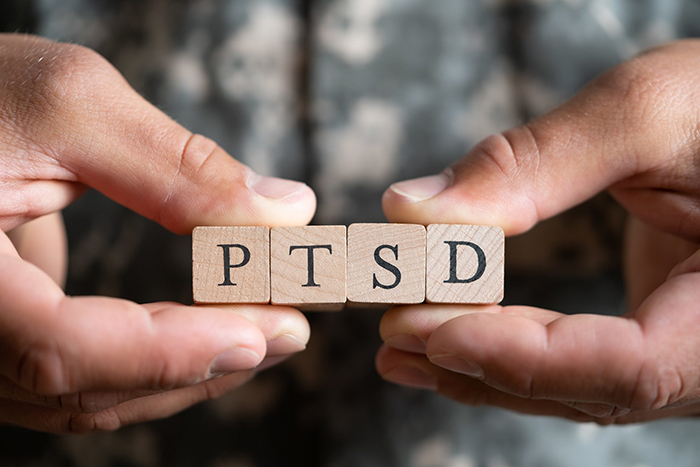The invisible wounds of military service can remain long after a veteran’s military service has ended, taking many forms – frequent nightmares, jumping at sudden noises, feeling withdrawn or disconnected, and more. In a discussion on the radio show “The Weekly Checkup,” Deputy Director Dr. Sheila Rauch and Executive Advisor Lieutenant General (ret.) William “Burke” Garrett spoke about post-traumatic stress disorder – or PTSD – as well as challenges veterans face when they transition back to civilian life and how the Emory Healthcare Veterans Program (EHVP) is working to remove barriers to care.
What is PTSD?
Rauch: One way to think about PTSD is as a specific memory of a traumatic event that won’t go away. Someone may struggle with the painful memories of a life-threatening experience, but instead of the memories getting better and easier to deal with over time, the memories continue to haunt the person. He or she may avoid reminders of the event and things that may trigger the memories. But even with that, the memories still come back.
Can someone heal from PTSD on their own?
Rauch: It varies from person to person, but research shows that it takes about three months for someone to see a natural reduction in symptoms after the traumatic event. So, in that period, we try to connect people with their social supports, community, and [their] own coping resources. When the symptoms last longer than three months, it impacts their ability to recover from the exposure on their own. We recommend seeking help from a mental health professional.
How many veterans and service members struggle with invisible wounds?
Rauch: Since 9/11, more than five million Americans have served in the armed forces. For most, serving in the military is a positive experience. Still, a significant minority, about 20 percent of 9/11-era veterans, will struggle with issues such as post-traumatic stress disorder, anxiety, or depression.
Does every veteran have PTSD?
Rauch: No. Not every veteran will struggle with PTSD, and not all of those who struggle with PTSD will have depression or a risk of suicide. Each person is unique and has his or her own unique issues.
Burke: Research shows that 7% to 8% of the U.S. population will have PTSD during their lives, and about eight million adults will have PTSD in any given year. And those are just from the diagnosed cases; the actual number of people struggling with undiagnosed PTSD is likely much higher. Military members face an increased risk of exposure to traumatic events and, thus, a higher risk of PTSD.
PTSD is most likely more common than you think, and it’s a national public health challenge that disproportionately affects those who serve our nation.
What challenges do service members face when transitioning to civilian life?
Burke: The transition from active military service to civilian life as a veteran is a big challenge. The military is tribal in a way, and veterans are leaving all these trusted networks and friends and comrades and moving into an entirely different way of life. The transition can even be difficult for people who think they have everything lined up because life doesn’t move in a straight line, and they have to adjust and deal with it.
Rauch: The period immediately following active duty is when we see the highest rate of suicide in our veteran community. We find that many veterans struggle with invisible wounds throughout their time in service but don’t seek help out of fear that it will impact their careers. Others didn’t realize the impact the traumatic experiences had on them until they were out of the military.
Is it enough for someone struggling with PTSD to talk with their buddies or loved ones?
Rauch: You can have a wonderful and supportive community, but that’s not going to cure your PTSD. I would say that’s certainly a piece, but we need both treatment and community. You need good treatment of the issue, whether it’s PTSD or depression, or an anxiety disorder. But you also need purpose in your life, community, and connection so that you can keep the gains made in treatment.
Removing Barriers to Care
Burke: Emory Healthcare Veterans Program (EHVP) addresses the three common barriers veterans face when accessing care for invisible wounds: access, stigma, and cost.
The first is access. Veterans face unique barriers to accessing adequate treatment through Veterans Affairs, including the requirement that they have either an honorable or general discharge to access medical benefits. Long wait times and geographic isolation also limit access to medical centers.
EHVP provides care for eligible post-9/11 veterans and service members regardless of their discharge status or location.
The second is stigma. The stigma around mental illness, and PTSD in particular, is strong, and stereotypes that depict veterans with PTSD as dangerous or unpredictable can promote that stigma. Some veterans with PTSD can fear embarrassment or shame, so stigma can delay their treatment.
We want to reframe PTSD as a challenge rather than a life sentence. Veterans are strong and resilient, but even the strongest of us need support sometimes. There is no shame in getting help; in fact, it’s a sign of strength. So, if you or someone you care about may be struggling with PTSD, the time to seek help is now. The treatments are highly effective and can transform lives forever.
The third is cost. Veterans who seek treatment can incur high costs. They have to take time off from work, obtain childcare, pay for transportation and lodging, deal with insurance copays if they’re outside of the VA, assuming that they even have healthcare coverage.
EHVP provides treatment at no cost to the veteran or service member. Thanks to our generous partners’ funding, we offer care at no cost, including travel, lodging, and meals for those participating in our Intensive Outpatient Program.
How Does Emory Healthcare Veterans Program Heal Invisible Wounds?
Burke: Emory Healthcare Veterans Program (EHVP) treats conditions such as post-traumatic stress disorder (PTSD), traumatic brain injury (TBI), military sexual trauma (MST), anxiety, and depression related to military service. Treatment is free and confidential for eligible post-9/11 veterans and service members living anywhere in the United States regardless of discharge status, deployment history, or length of service. The two-week Intensive Outpatient Program is offered in-person at our clinic or via telehealth in eligible states.
The Emory Difference
Rauch: Traditional therapy provides treatment through eight to 15 sessions over 12 weeks. However, about half of the patients in traditional therapy don’t complete treatment. In comparison, EHVP has a 90% completion rate. Our program participants see the same, if not more, significant changes than if they had completed the traditional treatment. So, we’re retaining people and getting outstanding outcomes as well. Participants receive a year’s worth of evidence-based therapy in two weeks through the Intensive Outpatient Program.
Emory Healthcare Veterans Program
Emory Healthcare Veterans Program treats conditions such as post-traumatic stress disorder (PTSD), traumatic brain injury (TBI), military sexual trauma (MST), anxiety, and depression related to military service. Treatment is free and confidential for eligible post-9/11 veterans and service members living anywhere in the United States regardless of discharge status, deployment history, or length of service. The two-week Intensive Outpatient Program is offered in-person at our clinic or via telehealth in eligible states.
Treatment works, and we are here to help. Call 888-514-5345 or complete the confidential online form to learn more.




